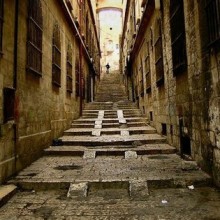In the early 13th century a few decades after Saladin had driven the Crusaders out of the city, a notable Indian religious figure made his way to Jerusalem. He came from a village in Punjab (now Pakistan) and his birth name was Khwaja Farīduddīn Mas’ūd Ganjshakar but he was better known as Baba Farid. Baba Farid was a devoted follower of Sufism (an Islamic discipline), more specifically the Chisti order which was based on principles of openness, compassion and truthfulness. He was on a journey to Islamic countries for 18 years when he came by Jerusalem and was offered a property by the local Islamic community inside the gates of the Old City. He spent 40 days isolated in prayer, fasting and spending a lot of his time at Al Aqusa mosque. Once he left, the site was known as Az-Zawiya al-Faridiya, a charitable property meant for the purpose of prayers. Returning to India he eventually became the head of the Chisti order and Indian Muslims who cherished him very much made the pilgrimage to Jerusalem and followed in his footsteps, praying in the same places he had. With the influx of Indian Muslims arriving in Az-Zawiya al-Faridiya, a shrine and lodge was made dedicated to his Baba Farid’s dervishes—thus the Indian Hospice in Jerusalem was founded.
The year the Ottoman Empire collapsed; in 1922 was when the Indian Hospice was about to flourish. Sufi groups all over the Islamic world joined Indians in Jerusalem and funds started coming in, building new schools and mosques. In 1923 the Islamic Higher Supreme Council sent a delegation to join the Khilafat movement in India and meet with wealthy Muslim men and women to tell them of the lodge, hoping to receive donations for restoration. They also wanted to recruit someone to come to Jerusalem, take charge of the lodge and revive the idea of Jerusalem as a holy land for Indian Muslims. Nazir Hasan Ansari arrived to Jerusalem in 1924 and was the Sheikh for 27 years, not only restoring people’s faith but also enabled great improvements to the lodge. From the 1920’s to the 1930’s, Sheikh Nazir travelled regularly to India, meeting with Princes and other notable wealthy Muslims, telling them about the Indian Hospice persuading them to pay for repairs. Sheikh Nazir married a Palestinian woman, and in 1928 she gave birth to their son, Munir.
People came from India to Jerusalem in ships bringing with them food and spices, keeping their traditions close. Sadly in the late 1940’s, the war and tensions in the city of Jerusalem and resulted in a scarce amount of pilgrims arriving. Before 1948 when the Arab-Israeli war broke out, the lodge had been a leave camp for the Indian Fourth Infantry division (the first Indian division to go overseas in WWII), and after 1948 the lodge was rundown by shelling and swarmed with Palestinian refugees. In 1967 during the Six-Day War the Indian hospice was once again almost pulverized by rockets. Wounded and despaired Jordanian soldiers asked for refuge at the hospice, then at night ran away leaving behind their uniforms and weapons. The second day of the war the Israelis came into the Old City and bombarded the hospice. After several casualties and having witnessed the lodge turn into ruins, the morale of the community was low. Sufism had been seen by some as an anachronism. That said the community did not let their faith astray and refused to abandon their home and years of hard work. Baba Farid had had a big impact on Sufis; they believed in a tradition that ‘spoke more of God’s gentleness than of his severity’. The first pilgrims that came to Jerusalem brought instruments and melodies from the Punjab, which was Baba Farid’s native village. They sung verses of Baba Farid’s poetry that had been written in Punjabi, which was unheard of at the time as literature was written in Arabic or Sanskrit. This laid a foundation for Punjabi literature, which has evolved successfully ever since.
Today, the head of the Indian Hospice is Sheikh Muhammed Munir Ansari, the son of Sheikh Nazir. He was given an award in 2011, the Pravasi Bharatiya Samman by the Indian President for exceptional service to the country. To this day, the Indian Hospice is in very good condition; has a library, mosque and guest rooms for Indians who still occasionally visit.


